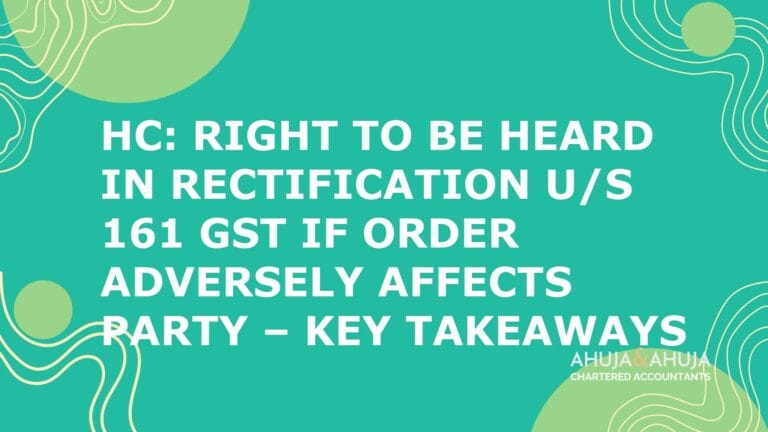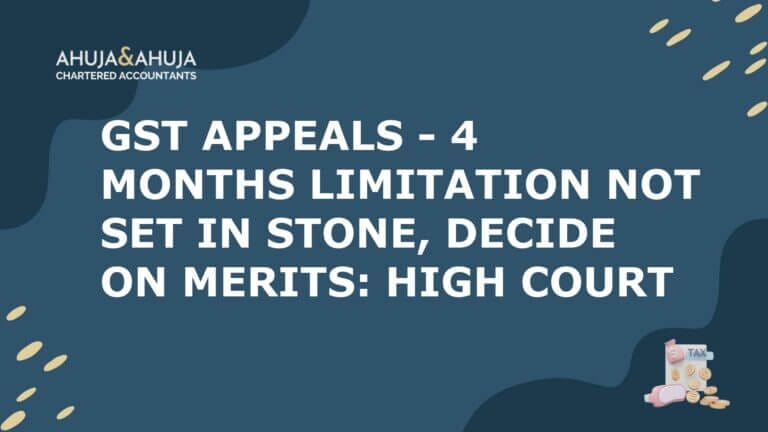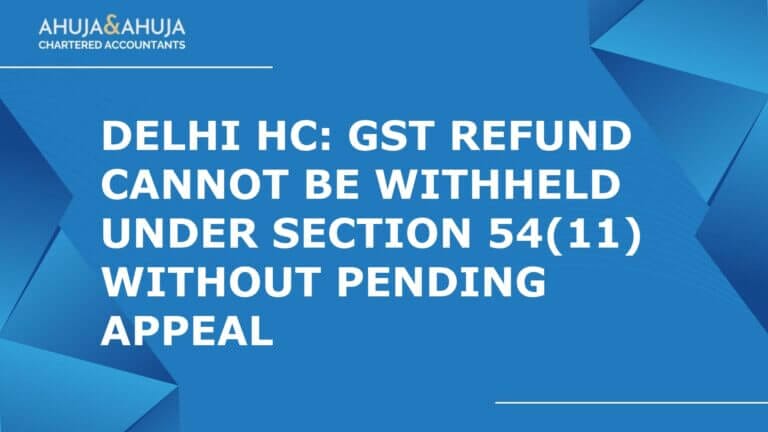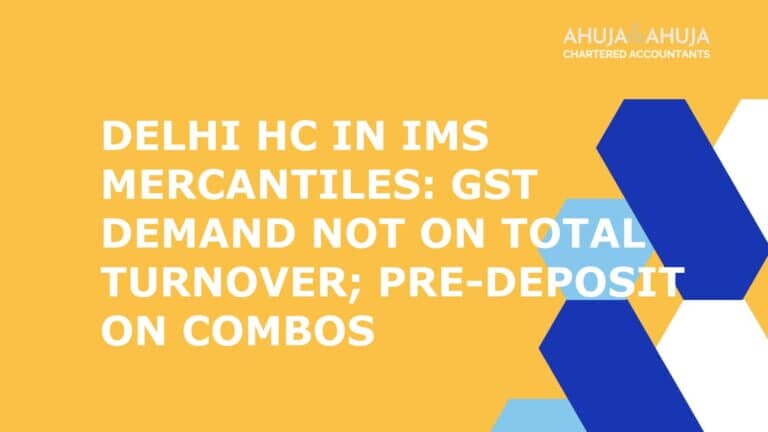Delhi HC Sets Crucial Precedent: No Withholding GST ITC Refunds Without Challenging Appellate Orders
For exporters and GST-registered businesses, the timely release of Input Tax Credit (ITC) refunds is more than a matter of cash flow—it’s a lifeline for operational continuity and global competitiveness. The recent Delhi High Court order in JVG Technology Pvt Ltd v. Commissioner CGST has set a transformative precedent, clarifying that the GST Department cannot withhold ITC refunds after a favorable Appellate Authority order unless it has actually challenged that order or obtained a stay. This decision not only resolves a persistent pain point for taxpayers but also recalibrates the balance of administrative discretion and taxpayer rights under the GST regime.
Why This Judgment Matters
Exporters and other taxpayers often find themselves in a procedural maze: even after winning at the appellate stage, refunds are delayed on the grounds that the Department “intends” to appeal or believes the refund could harm revenue. The Delhi High Court’s ruling decisively breaks this cycle, holding that mere intention or internal opinion is not enough—there must be a pending appeal or stay for the Department to lawfully withhold a refund under Section 54(11) of the CGST Act.
Case Chronology
Let’s unpack the facts. JVG Technology Pvt Ltd, an exporter of mobile phones, regularly accumulated unutilized ITC due to its business model. After its refund claims for September and October 2022 were rejected at the initial stage, the company appealed. The Appellate Authority overturned the rejection, allowing the refund. Yet, despite repeated requests, the Department refused to release the funds, citing a “planned” appeal and invoking Section 54(11).
This impasse forced the taxpayer to approach the Delhi High Court (location Delhi). The Department argued that releasing the refund would adversely affect revenue, especially in light of alleged fraud, and that it was considering an appeal. The High Court, however, was unambiguous: unless an actual appeal or stay is in place, the Department cannot withhold the refund. The Court drew on its own precedents, including Shalender Kumar and G.S. Industries, to reinforce this principle.
Procedural Roadmap: Ensuring Prompt ITC Refunds Post-Appellate Order
So, what should taxpayers do to ensure they don’t get caught in a similar limbo? Here’s a step-by-step guide:
- Timely Submission and Vigilance: File refund claims promptly and respond to any Show Cause Notices (SCNs) with complete documentation.
- Appeal and Follow-Up: If a refund is rejected, pursue the appellate process without delay. Once a favorable order is received, immediately submit formal requests for refund release, referencing the appellate decision and consider consulting experts offering GST refund services.
- Monitor and Engage: Regularly track the status of your refund application through the GST portal and maintain open communication with the relevant GST officers.
- Escalate When Needed: If the refund is not processed within a reasonable time after the appellate order, escalate the matter in writing. Clearly cite the Delhi HC precedent and request written reasons for any further delay.
- Document Everything: Keep meticulous records of all correspondence, orders, and follow-ups. This evidentiary trail is crucial if judicial intervention becomes necessary.
Legal Recourse When Refunds Are Withheld Without Appeal or Stay
If, despite a clear appellate order and no pending departmental challenge, the refund remains stuck, taxpayers have robust legal remedies:
- Writ Petition Under Article 226: Approach the High Court to enforce the appellate order. Courts have shown a clear preference for swift intervention in such cases.
- Contempt or Implementation Applications: If the Department fails to comply with a court order, file for contempt or seek further directions for implementation.
- Grounds to Emphasize: Highlight the absence of any appeal or stay, the binding nature of the appellate order, and the Delhi HC’s clear stance that mere departmental intent is insufficient.
Section 54(11) of the CGST Act—A Statutory Reality Check
The heart of the dispute lies in the interpretation of Section 54(11). The Department has often relied on this provision to justify withholding refunds, but the Delhi HC has clarified its boundaries:
- Two Essential Conditions: (1) There must be an actual appeal or other proceeding pending against the refund order; (2) The Commissioner must form an opinion that releasing the refund would adversely affect revenue.
- No Room for “Intent” Alone: The Court made it clear that an internal decision or plan to appeal does not meet the statutory threshold. Administrative discretion cannot override the taxpayer’s right to timely refund once the appellate process has concluded in their favor.
Building a Strong Evidentiary Case for Refund Release
Exporters and taxpayers should be proactive in assembling a comprehensive documentation set:
- Appellate Order Copies: Keep certified copies of the favorable appellate order.
- Refund Claim Tracking: Maintain logs of refund applications and their status.
- Correspondence Records: Archive all emails, letters, and portal communications with the Department.
- Proof of No Pending Appeal: Where possible, obtain written confirmation from the Department or use RTI applications to verify that no appeal has been filed.
- GST Returns and Export Documentation: Ensure all underlying tax and export records are up to date and readily accessible.
For businesses based in the NCR region, professionals such as Chartered Accountants in Ghaziabad can provide valuable assistance in documentation and follow-up.
What If the Department Appeals After Refund Release?
A common concern is the risk of recovery if the Department later files an appeal and succeeds. The Delhi HC addressed this head-on:
- Statutory Right of Recovery: If the Department ultimately prevails, it can recover the refunded amount, but only through due process and in accordance with law.
- Taxpayer Protections: Taxpayers are entitled to notice and an opportunity to be heard before any recovery action. Consider risk mitigation strategies such as maintaining an escrow or seeking indemnities where large sums are involved.
Interest on Delayed Refunds—Section 56 in Action
The judgment also reinforces the taxpayer’s entitlement to interest for delayed refunds:
- Automatic Entitlement: Interest accrues automatically under Section 56 for the period of delay beyond the statutory timeline.
- Calculation and Claim: Taxpayers should calculate the interest due, submit a formal claim if necessary, and be prepared to enforce this right through legal channels if the Department resists. Expert help in GST litigation services can assist here.
- Judicial Support: Courts have consistently upheld the right to interest, recognizing that delay in refunding taxpayer money is not just an administrative lapse but a financial injury.
Dispelling Myths—Clarifications from the Judgment
Both taxpayers and officers often misunderstand Section 54(11):
- Myth: The Department can withhold refunds based on intent to appeal or internal opinion.
- Reality: Only an actual, pending appeal or stay justifies withholding.
- Myth: An adverse revenue opinion alone is enough.
- Reality: The law requires both a pending proceeding and a reasoned opinion.
Leveraging the Precedent—Expediting Multiple Refunds
For businesses with several pending refund claims, this precedent is a powerful tool:
- Reference in Representations: Cite the Delhi HC order in all communications and representations for similar cases.
- Drafting Templates: Use precedent-citing templates to standardize requests and escalate delays.
- Systemic Impact: Early signs suggest that departments are beginning to align with this judicial guidance, though regional variations and case-specific nuances remain.
When Refunds Aren’t Credited by the Court’s Deadline
If the Department fails to credit the refund by the date specified by the court:
- File for Enforcement: Submit an application to the court for enforcement of its order, attaching all relevant documentation.
- Timelines and Protocol: Courts typically prioritize such enforcement applications, and contempt proceedings may follow for persistent non-compliance.
- Record-Keeping: Well-maintained records are your best defense and the fastest route to judicial relief.
For exporters operating from other regions, like Chartered Accountants in Chandigarh, local advisory support can be critical in managing complex refund claims.
Broader Implications
The Delhi HC’s decision is likely to influence refund-related litigation and administrative practices across India:
- Precedential Weight: Other High Courts may adopt similar reasoning, especially in the absence of a contrary Supreme Court ruling.
- Impact on CBIC Circulars: The Central Board of Indirect Taxes and Customs (CBIC) may issue clarifications or amend internal guidelines to reflect this judicial stance.
- Strategic Considerations: Businesses should stay alert to evolving jurisprudence and be ready to adapt their refund strategies accordingly.
Practical Tips for Businesses and Practitioners
- Monitor Refunds Regularly: Don’t wait for delays to escalate—track every claim.
- Be Legally Prepared: Keep templates and legal opinions ready for quick action.
- Engage Experts: Consult with GST professionals and legal advisers to navigate complex or high-value claims, leveraging services such as GST consultancy services.
A New Era for GST Refunds
The Delhi High Court’s precedent marks a significant step toward greater legal clarity and administrative accountability in the GST refund process. For taxpayers, it’s a call to vigilance and proactive engagement; for the Department, a reminder that procedural fairness and statutory compliance are non-negotiable. As the GST landscape continues to evolve, this judgment stands as a beacon for both prompt refunds and principled governance.
Disclaimer
The materials provided herein are solely for educational and informational purposes. No attorney/professional-client relationship is created when you access or use the site or the materials. The information presented on this site does not constitute legal or professional advice and should not be relied upon for such purposes or used as a substitute for professional or legal advice.


![GST: DRC-01 Summary Is Not SCN; Orders Without Formal Notice Quashed [Gauhati HC]](https://ezvqsuzp5qf.exactdn.com/wp-content/uploads/2025/11/gst-drc-01-summary-is-not-scn-orders-without-formal-notice-quashed-gauhati-hc-768x432.jpeg?strip=all)




